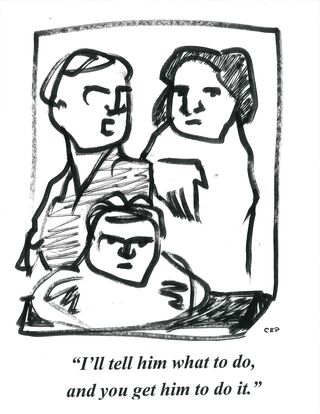Confidence
Helping Your Adolescent Build Self-Confidence
Self-confidence is a can-do attitude that empowers determination and effort.
Posted November 16, 2020

For the adolescent, confidence can often be hard to come by.
During childhood, the girl or boy may have felt relatively self-assured in the smaller, simpler, and sheltered world of home and family. But with the onset of adolescence (around ages 9 to 13), developmental insecurity begins. Now the teenager separates from childhood and parents to start the daunting coming-of-age passage through the larger world toward young adult independence – to young womanhood or young manhood.
Growing up keeps introducing more changes and challenges in the teenager’s path, creating fresh cause for self-doubt. “I can’t keep up!” “I won’t fit in!” “I’ll never learn!” “How will I get it done?” Parents may not always appreciate how, when youthful confidence is lacking, adolescence requires acts of courage to proceed. “Some days just showing up at school can feel scary to do!”
Coping with lack of confidence
How to help a young person cope with lack of confidence? By way of example, consider the common case of social shyness in middle school that can keep a young person more alone than she or he would like to be.
The child who had playmates in elementary school can become more socially intimidated in the push and shove of middle school when physical self-consciousness from puberty and social competition for belonging and fitting in can make making friends harder to do. As young people vie for standing, there can also be more social cruelty – teasing, rumoring, bullying excluding, and ganging up – to assert and defend social place.
As I was once told on lonely eighth-grader authority: “With all the meanness going around, middle school can be a good time not to have a lot of friends.” At the same time, she had a fervent desire to have a more socially satisfying high school experience. But how to accomplish this change when lack of confidence from shyness was holding her back?
I suggested that like all feelings, shyness can be very a good informant about one’s unhappy state, but it can also be a very bad advisor about how to relieve it. For example: “I’m not confident mixing with people, so I’ll feel better if I just keep to myself.” Following this emotional advice only makes shyness worse.
While it’s true that feelings can motivate actions; it’s also true that actions can alter feelings. So the prescription for the shy middle school student lacking social confidence was to put on an act. “Pretend to be more outgoing, and you’ll build confidence as you increasingly practice behaving that way.”
Empowering confidence
Worth parents listening for and affirming are adolescent statements of confidence. These express a can-do attitude and they come in many forms, a few of which are stated below.
“I can earn money.”
“I can make friends.”
“I can lift my spirits.”
“I can perform well.”
“I can finish what I start.”
“I can compete to do my best.”
“I can sustain important effort.”
“I can solve problems that arise.”
“I can speak up when I have need.”
“I can make myself do what needs doing.”
“I can keep agreements to myself and others.”
“I can work with people to help get things done.”
One job of parents is to encourage practices that enable their adolescents to make these and other kinds of self-affirming statements.
Confidence matters. It can inspire determination, empower effort, and support a sense of effectiveness: “I’m going to give it a shot.” Lack of confidence can reduce motivation, discourage effort, and lower self-esteem: “There’s no point in trying.”
Within the family, parents need to keep a tease-free, sarcasm-free, embarrassment-free home. Why? Because such belittling, like criticism, can injure confidence at a vulnerable age when believing in oneself becomes harder to do. So, no put-downs allowed.
Caution
All this said, supporting confidence in adolescents is not enough. Teaching adolescents how to direct it must also be done. After all, while human confidence can create much good, it can also inflict a great deal of harm. As history unhappily instructs, people who are very confident that they are right can commit a lot of wrong. So, by instruction and example, imparting ethical and responsible conduct matters even more.




